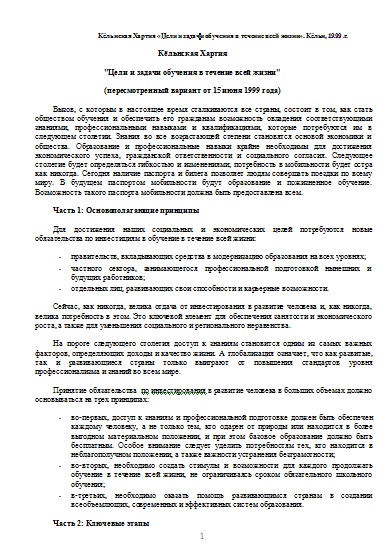The Cologne Charter
“Aims and Objectives of Lifelong Learning”
(Revised June 15, 1999)
 The challenge that all countries now face is how to become a learning society and ensure that its citizens can acquire the relevant knowledge, skills and qualifications that they will need in the next century. Knowledge is increasingly becoming the backbone of economies and societies. Education and skills are essential to economic success, civic responsibility, and social harmony. The next century will be defined by flexibility and change; the need for mobility will be more acute than ever. Today, having a passport and ticket allows people to travel around the world. In the future the passport of mobility will be education and lifelong learning. The possibility of such a mobility passport must be made available to all.
The challenge that all countries now face is how to become a learning society and ensure that its citizens can acquire the relevant knowledge, skills and qualifications that they will need in the next century. Knowledge is increasingly becoming the backbone of economies and societies. Education and skills are essential to economic success, civic responsibility, and social harmony. The next century will be defined by flexibility and change; the need for mobility will be more acute than ever. Today, having a passport and ticket allows people to travel around the world. In the future the passport of mobility will be education and lifelong learning. The possibility of such a mobility passport must be made available to all.
Part 1: Fundamental Principles
Achieving our social and economic goals will require a new commitment to investing in lifelong learning:
Governments investing in modernizing education at all levels;
the private sector engaged in the training of current and future workers;
individuals developing their abilities and career opportunities.
The return on investment in human development is greater than ever and the need for it is greater than ever. It is a key element for employment and economic growth, as well as for reducing social and regional inequalities.
At the threshold of the next century, access to knowledge is becoming one of the most important determinants of income and quality of life. And globalization means that both developed and developing countries will benefit from rising standards of professionalism and knowledge worldwide.
A commitment to investing heavily in human development should be based on three principles:
First, access to knowledge and training should be available to everyone, not just those who are naturally gifted or better off, and basic education should be free. Special attention should be given to the needs of those who are disadvantaged and to the importance of eliminating illiteracy;
Second, there must be incentives and opportunities for everyone to pursue lifelong learning beyond the time of compulsory schooling;
Third, developing countries must be assisted in building comprehensive, modern and effective education systems.
Part 2: Key milestones
The key milestones of the lifelong learning and training strategy are:
high quality early childhood education;
primary education that equips all children with solid reading, writing, arithmetic and information and communication technology (ICT) skills, as well as essential social skills;
Secondary education in schools that is responsive to the needs of the labour markets, which develops the necessary skills and abilities in all students, not just those who aspire to higher education and professional careers;
Vocational training that provides skills that meet the needs of the labor market and the requirements of the latest technology, and that paves the way for the acquisition of higher professional qualifications in various fields;
higher education that opens up opportunities for everyone who can benefit from working as a certified professional, with the financial support necessary to ensure access to it for all who can take advantage of these opportunities;
vocational training for adults that is appropriately supported by the state or employers, meets the needs of the family, and provides meaningful opportunities for lifelong professional retraining.
This process should include the operation of high quality on-the-job training systems and equipping people with the skills they need to educate themselves. At all stages of learning, emphasis should be placed on students’ awareness of the importance of creativity, entrepreneurship and education for democratic citizenship, including respect for the political, civil and human rights of all people, the values of tolerance and pluralism, and understanding and respect for diverse populations, viewpoints and traditions.
Part 3: Fundamental Elements
Educational systems have strong national characteristics and play a very important role in the development of cultural diversity. However, there are important areas in which different countries have common priorities and approaches or have already identified the most effective strategies for modernizing their education and training systems to raise standards at all levels.
The fundamental elements are as follows:
Teachers are the most important source of facilitating modernization and raising standards; the selection, training, employment, and appropriate incentives for teachers are critical to the success of any educational system;
the complementary role of private and public investment in education, and the need to increase overall investment in education and training;
Modern and efficient ICT networks to support traditional teaching and learning methods, as well as to increase the number and variety of teaching and training programs, e.g., through the introduction of distance learning methods;
Continued development and refinement of internationally recognized proficiency tests for students;
Recognition of professional qualifications and work experience;
Promoting the learning of foreign languages to enhance understanding of different cultures and to increase mobility in a globalized world;
greater emphasis on setting clear goals for higher standards and levels of achievement;
The need to promote a culture of entrepreneurship in public and private education, not least in the development of the strongest possible research and development linkages between universities and companies.